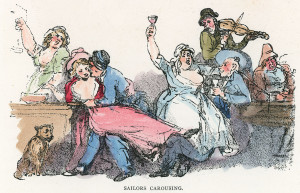“Jolly Roving Tar” deals with the cyclical plight of the sailor, always wanted and welcome when his pockets jingle, but pushed aside when the funds have dwindled for the next sailor with his pay. The last verse is sometimes referred to as the sailor’s “end of life” poetic reference, and which man among us hasn’t felt at some point in life abandoned by a lady love once the funds have dwindled?!
Jos. Morneault
Ships may come and ships may go as long as the sea does roll.
Each sailor lad just like his dad, he loves the flowing bowl.
A trip on shore he does adore with a girl what’s plump and round.
But when the money’s gone it’s the same old song,
“Get up Jack! John, sit down!”
[Chorus:]
Come along, come along, You jolly brave boys,
There’s lots of grog in the jar.
We’ll plough the briny ocean with
the jolly roving tar.
When Jack comes in, it’s then he’ll steer to some old boarding house.
They’ll welcome him with rum and gin; they feed him on pork scouse.
He’ll lend, spend and not offend till he’s lyin’ drunk on the ground
For when the money’s gone it’s the same old song,
“Get up Jack! John, sit down!”
[Chorus]
It’s then he’ll sail aboard some ship for India or Japan.
In Asia there the ladies fair all love the sailor man.
He’ll go to shore out on a tear and he’ll buy some girl a gown.
But when the money’s gone it’s the same old song,
“Get up Jack! John, sit down!”
[Chorus]
When Jack gets tired and weatherbeat; too old to roam about,
They’ll let him stop in some rum shop ‘till eight bells calls him out.
Then he’ll raise his eyes up to the skies, Sayin’ “Boys, we’re homeward bound.”
For when the money’s gone it’s the same old song,
“Get up Jack! John, sit down!”
[Chorus]

